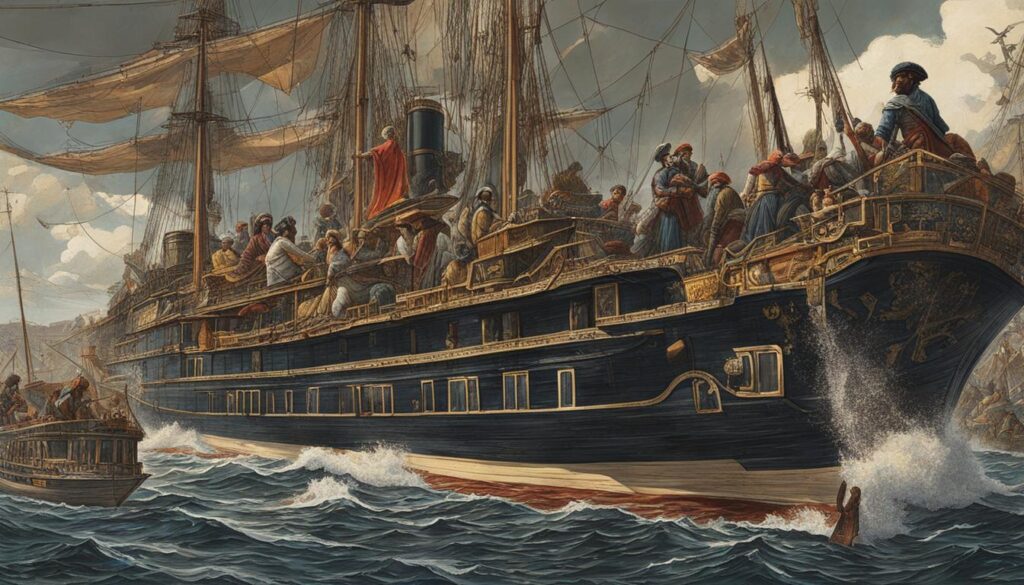If you’re looking for a book that will take you on an unforgettable adventure through time, then look no further than “English Passengers” by Matthew Kneale. This book summary will give you a taste of the incredible journey that awaits you. Rich in historical detail, vibrant characters, and thrilling plot twists, this novel promises to be a reading experience like no other.
Overview of “English Passengers”
In “English Passengers” by Matthew Kneale, readers are taken on a thrilling journey filled with history, adventure, and complex characters. The novel’s plot follows the journey of a group of passengers aboard the ship, the “Sincerity,” as they search for undiscovered lands and riches.
The main characters include Captain Illiam Quillian Kewley and Reverend Geoffrey Wilson, who have differing motivations for embarking on this voyage. Other passengers have their unique stories as well, ranging from a botanist to a racist physician to a smuggler.
The novel explores several themes, including the exploitation of indigenous peoples, prejudice, and the consequences of greed and colonialism. It balances these heavy themes with humorous moments, creating an engaging and thoughtful read.
Plot Summary of “English Passengers”
The plot of “English Passengers” is a fascinating mix of adventure, history, and mystery. The novel begins in 1857 on the Isle of Man, where Captain Kewley is approached by Reverend Wilson, who is searching for the Garden of Eden. Kewley agrees to take Wilson and his ragtag group of passengers on his ship, the “Sincerity,” on a journey into uncharted territory in Tasmania.
As the voyage unfolds, tensions rise among the passengers as they navigate the dangerous waters of the southern hemisphere. Along the way, they encounter indigenous tribes, battles with other European settlers, and even a shocking murder. The plot twists and turns, leaving readers on the edge of their seats until the very end.
Main Themes in “English Passengers”
“English Passengers” explores several themes that are relevant not only to the time period in which the novel is set but also to the present day. One of the most prominent themes is the exploitation of indigenous peoples, a topic that still resonates today. The novel serves as a reminder of the atrocities committed by European colonizers and the ongoing legacy of colonialism.
Another theme explored in the novel is prejudice. Many of the characters demonstrate racist attitudes toward the indigenous peoples they encounter, despite their supposed intelligence and education. Additionally, the novel touches on the consequences of greed and colonialism, showing the devastating impacts they have on the environment, local economies, and indigenous cultures.
Characters in “English Passengers”
“English Passengers” features a diverse cast of characters, each with their own motivations and role to play in the plot. Captain Kewley is an enigmatic and skilled seaman, willing to take risks to achieve his goals. Reverend Wilson is a deeply flawed and sometimes delusional man, who becomes increasingly unstable as the voyage progresses. Other notable characters include the botanist, Dr. Potter, who is determined to find rare plant species, and the physician, Dr. Thomas Potter, who holds deeply prejudiced views towards the indigenous peoples they encounter.
Writing Style and Structure of “English Passengers”
Matthew Kneale’s writing style in “English Passengers” is both engaging and descriptive. The novel is structured as a series of chapters, alternating between different characters and perspectives. This allows readers to gain insight into the motivations and thoughts of each character, and creates a sense of tension and mystery as the plot unfolds.
“The sea is like a carnival of mirrors, or maybe a taunting picture gallery where everything is the wrong way round. But land is different. You look up and there are new stars there, or maybe stars that are the same but which now shine for you for the first time, as if you are being read a poem.”
Critical Reception of “English Passengers”
“English Passengers” has received critical acclaim since its publication in 2000. The novel won the Whitbread Book of the Year award and was shortlisted for the Booker Prize, among other awards. Critics have praised the novel’s engaging plot, complex characters, and thought-provoking themes.
Significance and Impact of “English Passengers”
“English Passengers” is a significant novel both for its exploration of important themes and its contribution to the literary canon. The novel serves as a reminder of the ongoing legacy of colonialism and the need for continued examination and reflection. Its impact has been significant, inspiring readers to think critically about history, society, and the world around them.
Historical Context in “English Passengers”
Set in the mid-19th century, “English Passengers” by Matthew Kneale takes place during a pivotal moment in history, characterized by imperial expansion, scientific racism, and social upheaval. The novel traces the journeys of a group of Englishmen seeking to discover the Garden of Eden in Tasmania, while another group of men embark on a mission to kidnap a local tribe and search for ancient artifacts.
The historical context of the novel is shaped by the European expansion into new territories, which brought about encounters with different peoples and cultures. The novel also reflects the scientific theories of the time, which provided intellectual justification for imperialism and racial superiority. Additionally, the novel portrays the social and political tensions in England, including economic inequality and religious conflict.
The author’s meticulous research and attention to detail recreate a rich and complex historical world that illuminates the events and characters in the story. By vividly depicting the historical context, the novel offers a nuanced and thought-provoking examination of the themes of power, identity, and exploration.
One example of the historical context featured in the novel is the impact of colonialism on the indigenous peoples of Tasmania. The novel depicts the brutal treatment of the Aboriginal Tasmanians and the devastating consequences of European colonization on their culture and well-being. This raises important questions about the ethical implications of imperialism and the responsibility of those who benefit from it.
Moreover, the novel also explores the relationship between religion and science during the period, as the characters encounter different systems of belief. The novel also showcases the various points of view on slavery, which was on the verge of being abolished in the British Empire at the time.
“The past has never been closer than now.” – Matthew Kneale, English Passengers
Main Characters in “English Passengers”
In “English Passengers,” author Matthew Kneale creates a cast of complex and multifaceted characters that drive the narrative. These characters include:
| Name | Description |
|---|---|
| Captain Illiam Quillian Kewley | The captain of the The Sincerity, a smuggler and illegal slave trader. Kewley’s journey makes up a significant portion of the novel. He is described as a rough and tough captain who is deeply troubled by the morality of what he does. |
| Dr. Thomas Potter | An amateur scientist who joins the ship in hopes of finding evidence of the Garden of Eden. Dr. Potter is a quirky and endearing character. His obsession with scientific discovery often leads to humorous and absurd situations. |
| Peevay | An aboriginal native of Tasmania who becomes an inadvertent guide for Dr. Potter and his expedition team. Peevay’s story is one of displacement, dispossession, and betrayal. His character is both sensitive and fierce, and his interactions with the other characters provide a critical look into the attitudes and prejudices of that time period. |
Each of these characters brings a unique perspective and challenge to the story, ensuring a rich and compelling reading experience.
Plot Summary of “English Passengers”
The plot of “English Passengers” by Matthew Kneale is a thrilling adventure that takes place over multiple centuries and follows a diverse cast of characters. In 1857, the Reverend Geoffrey Wilson sets out to prove the literal truth of the Bible, enlisting the help of the smuggler Captain Illiam Quillian Kewley and his ship, the Sincerity. They travel to Tasmania where they believe the Garden of Eden is located. Meanwhile, on the Isle of Man, Aboriginals kidnapped Arthur, a botanical illustrator, and his companions.
As the two groups move towards their fateful meeting, many twists and turns emerge, including shipwrecks, murders, and betrayals. The narrative shifts between past and present, providing the readers with a glimpse into the lives and perspectives of several characters. Kneale expertly weaves together historical events and personal stories, creating a rich and engaging plot that keeps readers on the edge of their seats.
“English Passengers is an extraordinarily rich and satisfying novel, historically vivid and witty, and the imaginative breadth of its plotting and characterization is immense.” – Pat Barker
Themes Explored in “English Passengers”
In “English Passengers,” Matthew Kneale explores several major themes, ranging from colonialism and racism to religion and morality. These themes not only add depth and complexity to the narrative but also reflect the socio-political realities of the time.
Colonialism
One of the primary themes in “English Passengers” is colonialism, which is depicted through the colonization of Tasmania by the British. Kneale exposes the brutality and hypocrisy inherent in colonialism, revealing how it leads to the subjugation and exploitation of indigenous peoples, as well as the destruction of their cultures and environments. Through characters such as Peevay-the Tasmanian native and Yandi, the Aboriginal guide, Kneale shows the impact of colonialism on their lives, and how the actions of the British invaders have lasting repercussions.
Racism
Another prevalent theme in the novel is racism, which is manifested in the treatment of the Tasmanian and Aboriginal people. The British characters in the novel exhibit a sense of superiority and entitlement over the natives, viewing them as inferior and barbaric. Kneale also highlights the impact of such beliefs on the attitudes and actions of the colonizers, leading to violence, oppression, and genocide.
Religion
The role of religion in colonialism and imperialism is also a significant theme in “English Passengers.” Through characters such as Rev. Wilson, Kneale explores the ways in which religion is used as a tool of power and domination, as well as its impact on the lives and cultures of the colonized people.
Morality
Kneale also grapples with questions of morality throughout the novel, highlighting the ethical dilemmas faced by the characters in their pursuit of knowledge, wealth, and power. Characters such as Captain Illiam Quillian Kewley embody a complex mix of corrupt and noble motives, raising questions of whether the ends justify the means.
Writing style and Structure of “English Passengers”
Matthew Kneale’s writing style in “English Passengers” is a unique blend of historical precision and artistic flair. The narrative structure is multi-layered and complex, with the story being told through multiple perspectives and timelines.
The author’s vivid descriptions and attention to detail bring the historical context to life, immersing the reader in the world of the novel. The writing style is at times lighthearted and humorous, while at other times tense and emotional, creating a dynamic and engaging reading experience.
The narrative structure of “English Passengers” is non-linear and intricate, with the author seamlessly weaving together multiple storylines and characters. The use of different voices and perspectives allows the reader to gain a multifaceted understanding of the events of the novel.
The use of a table can help illustrate the complexity.
| Timeline | Events | Perspective |
|---|---|---|
| 1830s | Ship voyage from England to Van Diemen’s Land | Captain Illiam Quillian Kewley, First Mate William Babel, Dr. Thomas Potter |
| 1850s | Australian gold rush | Evander Slope, Reverend Geoffrey Wilson, Peevay |
| Present-day | Archaeological expedition to Tasmania | Dr. Daniel Kindred, Dr. Cassius Hall |
The use of different perspectives and timelines allows the author to explore multiple themes and ideas, including colonialism, identity, and environmentalism.
The non-linear narrative structure of “English Passengers” enhances the reading experience, allowing the reader to gain a nuanced understanding of the events and characters in the novel.
Critical Reception of “English Passengers”
The novel “English Passengers” by Matthew Kneale has garnered widespread critical acclaim since its publication in 2000. The book has been praised for its unique storytelling style and vivid characters, earning it a spot on the shortlist for the prestigious Booker Prize.
According to literary experts, “English Passengers” stands out for its masterful blend of history, humor, and adventure. The novel’s exploration of themes such as colonization, cultural identity, and human relationships has resonated with readers and critics alike.
“Matthew Kneale’s ingenious story is alive with the comedy and cruelty of life, it’s an action-packed tale told in the author’s own unique voice.” – The New York Times
The critical reception of “English Passengers” has been overwhelmingly positive, with many reviewers hailing it as a work of literary genius. It has been described as a must-read for anyone who loves history, adventure, and excellent storytelling.
Book Awards and Achievements
The success of “English Passengers” is reflected in the numerous awards and honors it has received, including:
| Award/Honor | Year |
|---|---|
| Whitbread Book Awards – Novel Category | 2000 |
| Commonwealth Writers’ Prize – Overall Winner | 2001 |
| Booker Prize – Shortlisted | 2000 |
These accolades are a testament to the quality and originality of “English Passengers,” cementing its place as a literary classic.
Significance and Impact of English Passengers
English Passengers by Matthew Kneale is a book that not only tells an exciting story but also has cultural, historical, and literary significance. The book has received numerous awards, including the Whitbread Book of the Year in 2000, making it one of the most critically acclaimed books in recent times.
The book’s significance lies in its ability to showcase the cultural clash between the native people of Tasmania and colonial settlers. The book does not shy away from depicting the atrocities committed by the colonial settlers against the native people, making it a vital piece of literature that sheds light on an uncomfortable part of history.
Furthermore, the book’s historical impact stems from its ability to introduce readers to the lesser-known history of Tasmania, including the presence of early British explorers, the effects of colonialism, and its eventual displacement of the native people.
The literary significance of the book lies in the author’s skillful use of multiple narrators, each with their distinct voice and agenda. The use of these perspectives helps to create a complex and nuanced portrayal of the various events and characters in the book.
All of these factors combined make English Passengers a significant and impactful book that is sure to remain relevant for years to come.

Conclusion
In conclusion, “English Passengers” by Matthew Kneale is a fascinating novel that takes readers on an epic journey through history and adventure. The book summary provided in this article gives a detailed overview of the plot, characters, themes, and historical context explored in the story. The main characters are well-developed, and their roles and impact on the narrative are carefully crafted. Kneale’s writing style and narrative structure enhance the overall reading experience and keep readers engaged throughout the book.
The critical reception of “English Passengers” has been overwhelmingly positive, with many praising its cultural, historical, and literary contributions. The novel’s significance and impact cannot be overstated, as it sheds light on important themes and historical events.
Overall, “English Passengers” is a must-read for anyone interested in historical fiction, adventure, and exploring complex themes. This book summary has hopefully convinced you to add it to your reading list and experience the epic journey for yourself.



